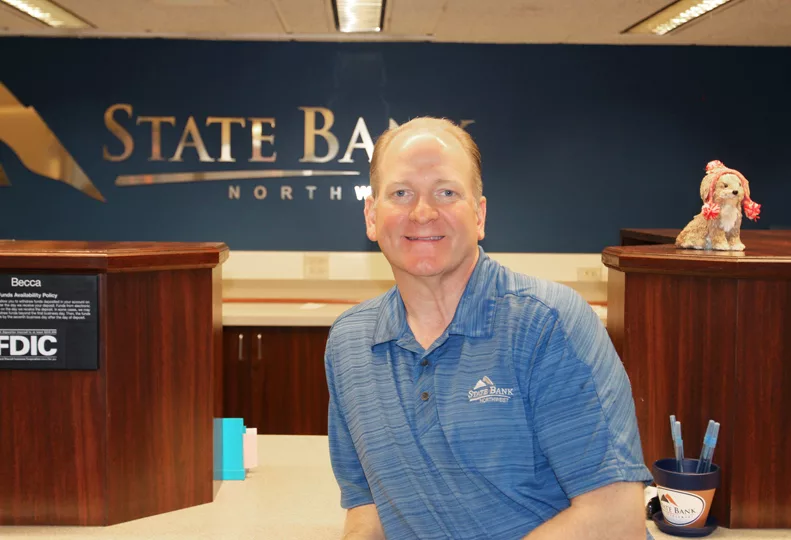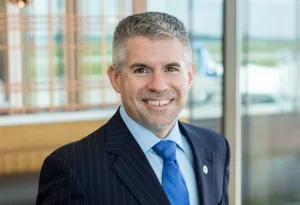
Home » Coming off banner year, State Bank projects growth
Coming off banner year, State Bank projects growth
Net income hit new high last year, Deckard says

February 1, 2018
Greg Deckard, president and CEO of 115-year-old State Bank Northwest, says the financial institution is poised for another strong year as it anticipates adding to its more than $140 million in assets.
Last year, the bank experienced a nearly 16 percent growth in outstanding loans from the previous year, in addition to a 7 percent increase in deposits, according to the bank’s 2017 fourth quarter report.
“We certainly anticipate growth this year,” says Deckard, adding that 2017 was one of the bank’s strongest years in its history, as the bank closed the year with an all-time record $1.6 million in net income.
State Bank Northwest is headquartered in Spokane Valley, at 12902 E. Sprague, in a three-level, 11,800-square-foot building.
The bank’s North Spokane office is located in 5,700 square feet of space at 9727 N. Nevada, and its original, 4,000-square-foot branch is in Garfield, Wash., 55 miles south of Spokane.
The three branches employ a total of 29 people with 20 working at the Spokane Valley branch, which also serves as the bank’s administrative office and houses its accounting, lending and information technology departments, says Deckard.
Expansion Developmental LLC, a private company made up of the bank’s 25 individual shareholders, owns all three State Bank Northwest buildings. Deckard, who has been at the bank for 19 years, says he’s also a part of the ownership group.
“We’re a niche bank with most of our customers being small businesses and companies or private individuals,” he says. Deckard declines to reveal the number of customer accounts at the bank. However, he says the majority of the bank’s customers are farmers in Spokane and Whitman counties who receive financial backing from the bank.
As a result of the seasonal nature of the agriculture industry, the amount of assets managed by the bank is subject to daily fluctuations depending on the time of the year, especially during harvest seasons, he says.
“We’ve had as high as $155 million in assets under management in any one day,” he says. “Today, there’s probably $140 to $145 million under management. We’re a small bank and want to stay that way.”
State Bank Northwest was founded on Oct. 25, 1902, by the Johnson brothers, Alfredd, Nellie, and Robert Johnson, and was capitalized with the sum of $25,000, Deckard says.
The Johnsons were a family of hardware and dry goods merchants, he says.
“They sought out a building in the center of what was a thriving region, banded together and founded the First State Bank of Garfield,” he says.
Deckard says the brothers wanted to create a bank that was intimate for its customers and could provide them with a strong sense of security, he says.
In 1922, the bank changed its name to State National Bank and operated under that name until 2006, when the bank’s board of directors decided the name sounded too institutional, Deckard says.
While renaming the bank to State Bank Northwest, the board converted its federal charter to a state charter and reformed its holding company to strengthen its autonomy, Deckard says.
“The state charter is more cost effective. It increased our legal lending limits, and more closely aligned with our goals as an independent community bank,” Deckard says.
Two years after becoming a state-chartered bank, the Great Recession rolled in, yet State Bank Northwest went on to have one of its most successful years.
“It was an advantage being a small bank, and we weren’t out there chasing exotic loans,” Deckard says.
Unfortunately, sweeping regulations imposed after the financial crisis had an aftereffect on smaller banks such as State Bank Northwest.
“We all got caught up in all the shrapnel of one-size-fits-all regulation that was imposed by Congress and federal regulators,” he says.
Deckard, who visited in Washington, D.C., last year, says he and bank officials continue to lobby for regulatory relief for the banking industry. Deckard, for several years now, has served on the board of the national Independent Community Bankers of America organization.
“There was sweeping regulatory reform meant to address financial institutions that were deemed too big to fail. So for the last 10 years, we’ve been dealing at a disproportionate rate with regulations not meant for us,” he says.
As the economy has strengthened and the Great Recession becomes a more distant memory, the banking industry is beginning to see many regulations recede.
“I’m having more fun as a community banker than I’ve had in years” he says.
“We still know our customers by name,” Deckard says. “It’s an actual part of our current mission statement.”
Today, Jeffrey S. Johnson, a grandson to the three founders, represents the family’s third generation maintaining an ownership interest on the bank’s board of directors, Deckard says.
Moving forward, State Bank Northwest desires to remain independent and control its own future.
“There’s no desire to be a part of a consolidation,” Deckard says.
Citing statistics from the FDIC, Deckard says there were 15,000 bank charters in the U.S. 15 years ago. That number has dropped to 9,000 today, the FDIC reports.
“You get larger, and you become more distant, ownership becomes more diluted, and then there are more disparate ownership goals,” he says.
Latest News Special Report Banking & Finance
Related Articles
Related Products

_web.webp?t=1769673727)
_web.webp?t=1769673728)
_web.webp?t=1769673735)
